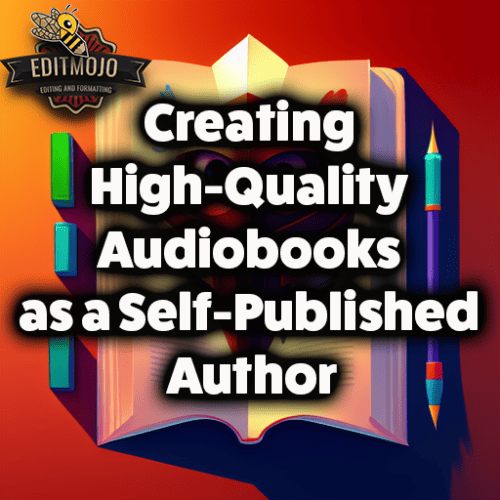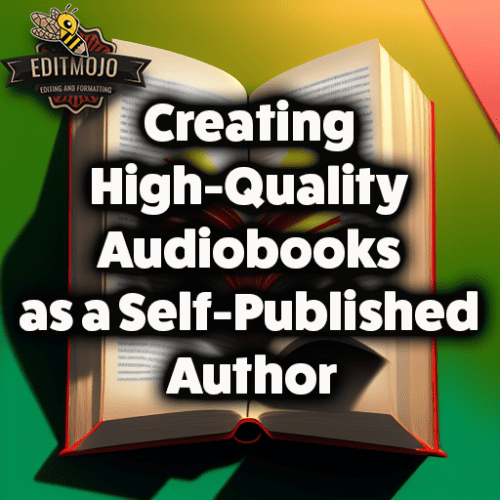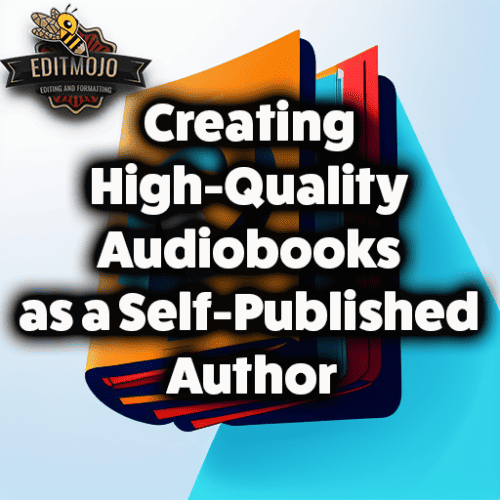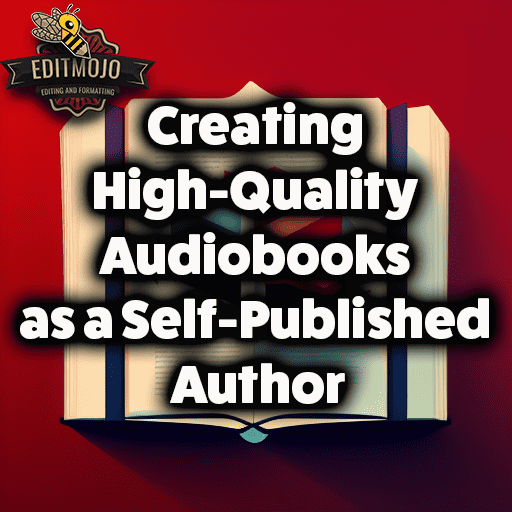Creating high-quality audiobooks as a self-published author
Creating high-quality audiobooks as a self-published author. Welcome to the age of digital media, where consuming literature is no longer confined to the pages of physical books or e-readers. As our world gets busier and multitasking becomes the norm, audiobooks have gained unprecedented popularity. Their appeal lies in their adaptability, offering the ability to ‘read’ while driving, cooking, or even working out. So, if you’re a self-published author looking to widen your audience reach, it’s time to dive into the world of audiobooks. This comprehensive guide will walk you through the essentials of creating high-quality audiobooks and reveal how to step up your author game.
Key Takeaways
| Topic | Key Takeaway |
|---|---|
| Understanding the Audiobook Market | The audiobook market is growing, especially among young, busy demographics, and in genres such as mystery, self-help, and science fiction. |
| Reasons for Audiobooks | Audiobooks increase accessibility for readers, offer a new revenue stream, give higher visibility on platforms like Audible, and cater to the multitasking trend. |
| Preparing Your Manuscript | Your manuscript needs to be adapted for audio with the right pacing, descriptive language, and natural dialogues. Professional editing can be very beneficial. |
| Choosing the Right Narrator | The narrator is crucial in bringing your story to life. Consider factors such as gender, age, accent, and tone when choosing your narrator. |
| The Audiobook Production Process | The production process involves recording, editing, proofing, and mastering. While you can DIY, professional services can ensure high-quality output. |
| Quality Control and Editing | Good sound editing is key to a great audiobook. Avoid common mistakes like background noise, inconsistent volume, and noticeable edits. |
| Distributing and Marketing | Choose the right platform for distribution and use effective marketing strategies to promote your audiobook. |
| Success Stories | Successful self-published audiobooks, like The Martian and Fifty Shades Trilogy, show the potential of audiobooks in boosting popularity and sales. |
II. Understanding the Audiobook Market
Before embarking on your audiobook journey, understanding the audiobook market is crucial. The latest reports highlight a significant surge in audiobook consumption, particularly among younger demographics who are often on the move. Furthermore, genres such as mystery, self-help, and science fiction are making waves in the audiobook realm, presenting unique opportunities for authors in these categories.

III. Reasons Why Self-Published Authors Should Consider Audiobooks
Audiobooks aren’t just a trend – they’re a beneficial addition to your portfolio. First and foremost, they increase accessibility for your readers. Those with visual impairments, dyslexia, or a busy schedule would appreciate your content in an audio format.
Moreover, audiobooks provide a new revenue stream, often with higher profit margins due to their perceived value. They also offer greater visibility on platforms like Audible, where an author with both a printed and audio version of their book might have an edge over one with only the former.
Lastly, audiobooks tap into our society’s penchant for multitasking. An audiobook allows your readers to immerse themselves in your world without setting aside dedicated reading time.
IV. Preparing Your Manuscript for Audiobook Production
The journey from manuscript to audiobook isn’t as simple as reading it out loud. You’re creating an auditory experience, not just reading a story. Consider enhancing your descriptive language to paint a vivid picture for your listeners. Dialogue should flow naturally, emulating real conversations. Adjust your pacing for listener comprehension. Too fast can be hard to follow; too slow might bore your audience.
Consider getting your manuscript professionally edited. Editors have a keen eye for spotting details that might disrupt the audio experience. For instance, repetitive words or phrases become more noticeable in audio. A professional touch ensures your script is audiobook-ready.

V. Choosing the Right Narrator
Choosing the right narrator is like casting the perfect actor for a movie role. Your narrator breathes life into your characters, setting the tone for your story. Several factors come into play, including the narrator’s gender, age, accent, and emotional range. There are platforms such as ACX and Findaway Voices that connect authors with professional narrators. When auditioning, ensure that the narrator fits your characters and maintains a consistent, comfortable pace.
(Creating high-quality audiobooks as a self-published author)
VI. The Audiobook Production Process
Audiobook production might seem daunting, but understanding the process can ease your worries. Generally, it involves recording, editing, proofing, and mastering. Unless you have a professional recording studio at your disposal, it’s advisable to hire a producer.
However, if you’re inclined towards a DIY approach, ensure you have the necessary
equipment, including a high-quality microphone, pop filter, and a quiet recording environment. Remember, even the best stories can be marred by poor audio quality.
VII. Quality Control and Editing
Audio editing is the unsung hero of your audiobook production. This stage can make or break your final product. Common mistakes to avoid include background noise, inconsistent volume, and noticeable edits. You can opt for professional editing services or do it yourself using software like Audacity or GarageBand.
VIII. Distributing and Marketing Your Audiobook
Once your audiobook is ready, it’s time to get it out into the world. Choose a distribution platform that aligns with your target audience and revenue goals. Platforms like Audible, iTunes, and Google Play are popular choices.
To make your audiobook stand out, utilize effective marketing strategies. Leverage social media, collaborate with book bloggers and podcasters, and capitalize on the power of reviews. A well-structured pricing strategy can also enhance your audiobook’s appeal.

IX. Case Studies: Success Stories of Self-Published Audiobooks
For inspiration, look no further than the success stories of Andy Weir’s The Martian and E.L. James’ Fifty Shades Trilogy. Initially self-published, both authors extended their reach through audiobooks, resulting in a huge boost in popularity and sales. Their experiences highlight the transformative potential of audiobooks in an author’s career.
X. Conclusion (Creating high-quality audiobooks as a self-published author)
Creating high-quality audiobooks as a self-published author can be a rewarding endeavor. It’s a unique way to extend your reach, diversify your income, and offer a different experience to your readers. Although the journey requires time and investment, the end product is well worth it. After all, as an author, what could be more gratifying than bringing your story to life in another medium?
XI. Resources and Further Reading
If you’re hungry for more knowledge, there are plenty of resources available. Websites like The Audiobook Creation Exchange Blog offer valuable tips and tutorials. Join communities such as The Audiobook Network to connect with other authors on the same journey. The world of audiobooks is vast and exciting – so get exploring!
XII. FAQ Section (Creating high-quality audiobooks as a self-published author)
Finally, check out our FAQ section where we address common questions and misconceptions about creating audiobooks as a self-published author. Dive into this treasure trove of information, and emerge ready to embark on your audiobook creation journey.
Top Five Questions and Answers
| Question | Answer |
|---|---|
| Why should I consider creating an audiobook as a self-published author? | Audiobooks can reach a wider audience, offer a new revenue stream, increase visibility on platforms like Audible, and cater to the multitasking trend. |
| How should I prepare my manuscript for an audiobook? | You should adapt your manuscript for audio, using descriptive language, natural dialogues, and good pacing. Professional editing can be very beneficial. |
| How important is the narrator for my audiobook? | The narrator plays a crucial role in your audiobook. They bring your story to life and set the tone for your narrative. |
| Can I produce my audiobook myself? | Yes, you can, provided you have the necessary equipment and editing software. However, using professional services can ensure a higher quality output. |
| How can I effectively market my audiobook? | You can market your audiobook by choosing the right platform for distribution, leveraging social media, collaborating with book bloggers and podcasters, and capitalizing on the power of reviews. |
